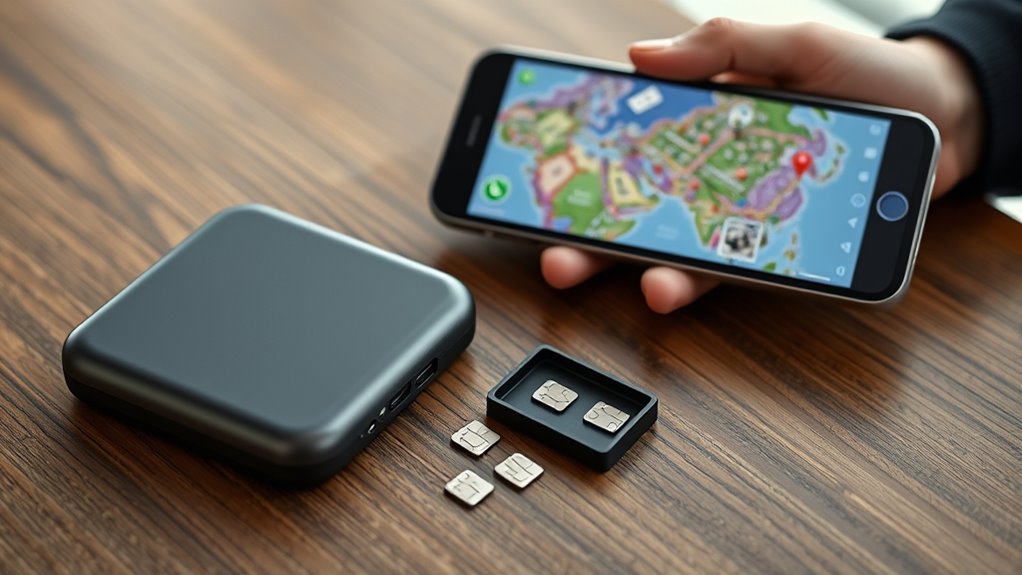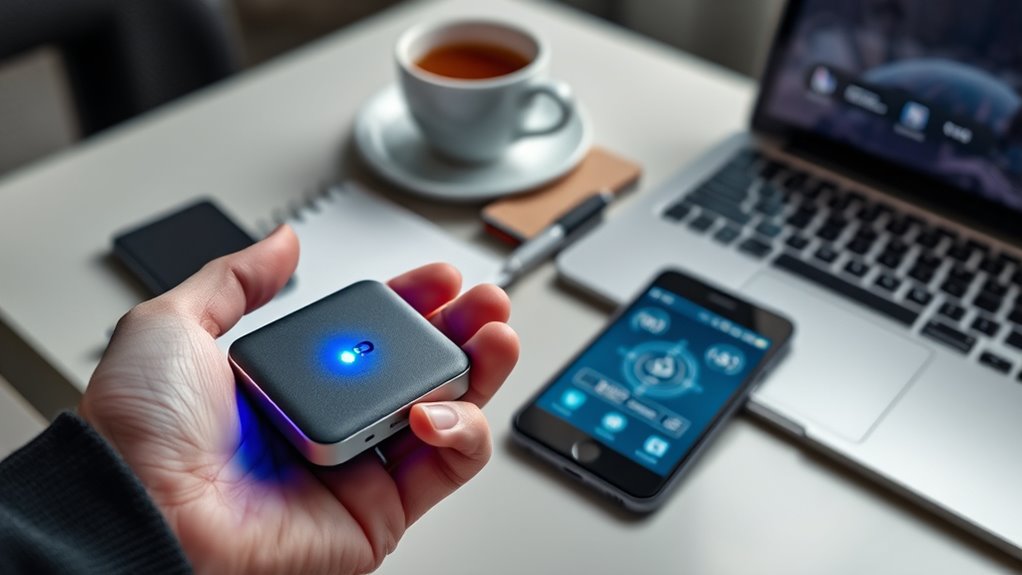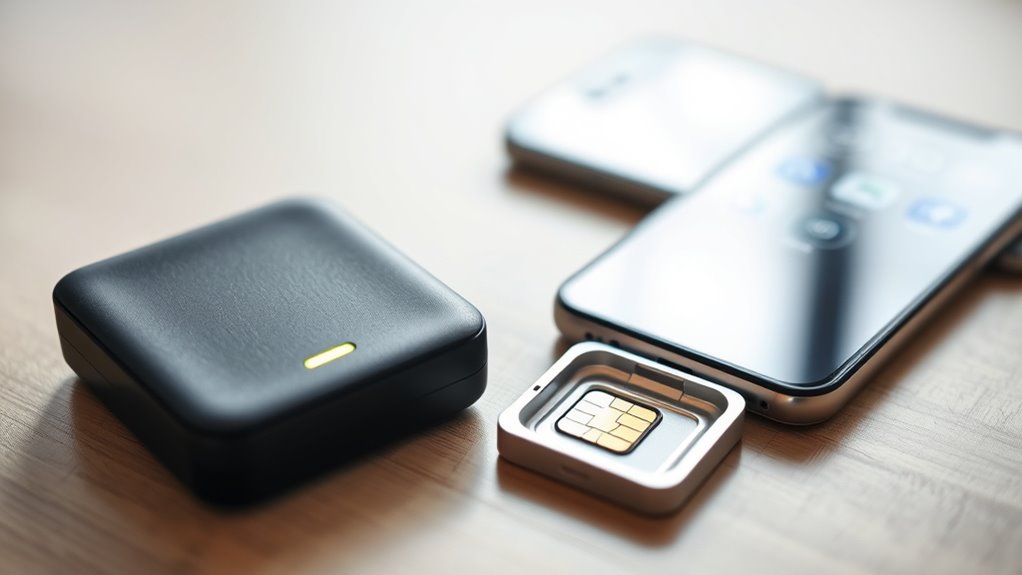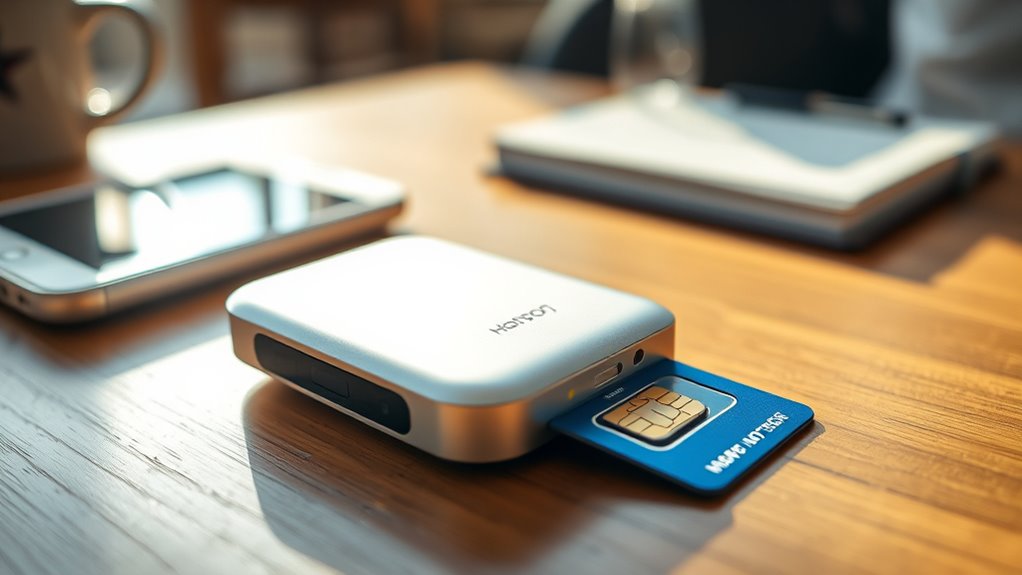When deciding between a mobile hotspot and a SIM card, consider your lifestyle and needs. Hotspots offer portable Wi-Fi that connects multiple devices, ideal for travelers or remote work, but tend to be more costly. SIM cards are budget-friendly and simple to use for smartphones and single devices, perfect for daily use. To find the best fit, explore how each option matches your device compatibility, data demands, and travel habits, with more details ahead.
Key Takeaways
- Mobile hotspots provide portable Wi-Fi for multiple devices, ideal for travelers and remote work.
- SIM cards offer direct mobile data access through smartphones or compatible devices, suitable for daily use.
- Hotspots generally cost more but support more connections; SIM cards are more budget-friendly for light usage.
- Hotspots require recharging and setup, while SIM cards are simple to insert and activate.
- Choose hotspots for flexible, multi-device connectivity; opt for SIM cards for straightforward, single-device mobile access.
How Mobile Hotspots Work and Their Benefits

Mobile hotspots are portable devices that create a Wi-Fi network using cellular data, allowing you to connect multiple devices on the go. They’re compact, easy to carry, and perfect for staying connected anywhere with cellular coverage. When you turn on a hotspot, it taps into cellular networks to generate a Wi-Fi signal your devices can join, like laptops, tablets, or other smartphones. This setup means you don’t need separate internet plans for each device, saving you money and hassle. One major benefit is flexibility—you can work remotely, stream content, or browse the web without relying on public Wi-Fi. Plus, many hotspots support multiple connections simultaneously, so your entire team or family can stay online without restrictions. Overall, they’re a reliable, convenient way to access the internet wherever cellular signals are available. Additionally, understanding headphone compatibility can enhance your multimedia experience when using portable devices. Incorporating advanced antenna technology can also improve signal strength and connection stability, ensuring a more reliable internet experience. Using a power bank can extend your hotspot’s battery life during long outings, making sure you stay connected for hours, especially when signal reception is weak or inconsistent.
Understanding SIM Cards and Their Advantages

A SIM card is a small chip that stores essential information allowing your device to connect to a cellular network. It contains your subscriber data, such as your phone number, carrier details, and authentication credentials. This enables seamless access to voice calls, texts, and mobile data. One key advantage is portability; you can swap your SIM card between devices, making it easy to switch phones or upgrade without losing your number or plan. SIM card technology also provides security, as they authenticate your identity on the network, reducing unauthorized access. Additionally, many carriers offer flexible plans that you can activate or change via your SIM card, giving you control over your data and service options. Overall, SIM cards make connecting to cellular networks simple, secure, and adaptable.
Comparing Cost and Data Plans for Hotspots and SIMs

When comparing costs and data plans for hotspots and SIM cards, you’ll find that prices vary widely based on provider, coverage, and plan features. Some plans offer unlimited data, while others have caps, affecting overall costs. To better understand, consider this table:
| Plan Type | Cost Range | Data Limits |
|---|---|---|
| Mobile Hotspot | $50 – $150/month | Unlimited or capped at 500GB |
| SIM Card | $10 – $60/month | Limited, often 5-50GB |
| Prepaid Plans | $10 – $100 upfront | Varies by usage |
Choosing the right option depends on your data needs and budget. Hotspots generally cost more but offer more flexibility, while SIM cards are budget-friendly for lighter use. Additionally, data plan flexibility can significantly impact your overall satisfaction with your choice. Flexible data plans can help you adapt to changing usage patterns and avoid unexpected charges, ensuring a more reliable connectivity experience. Being aware of electric bike horsepower can also help you select a device that matches your performance expectations.
Device Compatibility and Ease of Use

Device compatibility and ease of use are essential factors when choosing between mobile hotspots and SIM cards. With hotspots, you need to verify your device supports the hotspot’s network bands and Wi-Fi standards. Some hotspots are plug-and-play, while others require setup or app configuration, which can be a hassle if you’re not tech-savvy. Additionally, ensuring device support can prevent connectivity issues and enhance overall performance. SIM cards, on the other hand, are straightforward—just insert into your unlocked device, and you’re ready to go. However, compatibility depends on whether your device is unlocked and supports the right network frequencies. Ease of use also involves managing connections; hotspots can connect multiple devices simultaneously, but they may require frequent recharging. Additionally, automation in connectivity is increasingly used to improve user experience and device management. Ensuring your device supports network compatibility can prevent connectivity issues and enhance overall performance. SIM cards are simple, but limited to single-device use unless paired with a compatible device.
Which Option Suits Different Lifestyle Needs

Choosing between a mobile hotspot and a SIM card depends largely on your lifestyle and connectivity needs. If you’re always on the go, travel frequently, or need reliable internet for multiple devices, a mobile hotspot can be ideal. It offers portable Wi-Fi, letting you connect several gadgets simultaneously, perfect for remote workers or families. On the other hand, if you prefer a simple, cost-effective solution for your smartphone or don’t require constant connectivity, a SIM card is a better fit. It’s more convenient for daily use, offers direct network access, and usually comes with fewer setup requirements. Your decision should consider how often you travel, the number of devices you use, and whether you prioritize flexibility or simplicity. Additionally, understanding the differences in network setup and compatibility can help you choose the best option for your needs, especially since mobile hotspots often require an additional device and setup. For example, some sustainable brands now offer eco-friendly portable Wi-Fi devices, aligning technology with environmentally conscious choices. Moreover, evaluating your connectivity habits can ensure you select the most effective solution for staying connected.
Frequently Asked Questions
Can I Use a Mobile Hotspot Internationally Without Extra Charges?
You wonder if you can use a mobile hotspot internationally without extra charges. It depends on your provider and plan. Some carriers offer international data packages or free roaming, but many charge extra fees. Check your carrier’s policies before traveling. To avoid surprises, consider purchasing an international SIM card or a local data plan at your destination. This way, you stay connected without unexpected costs.
Are There Security Risks Associated With Using Public Wi-Fi Hotspots?
Imagine leaving your front door unsecured; using public Wi-Fi feels similar. Yes, there are security risks like data theft or malware. When you connect to open networks, hackers can intercept your information or set up fake hotspots to trap you. To stay safe, avoid sensitive transactions, use VPNs, and turn off sharing. Protecting your data is like locking your door—essential for peace of mind.
How Does Battery Life Compare Between Mobile Hotspots and Smartphones?
When comparing battery life, mobile hotspots usually drain their batteries faster than smartphones because they constantly transmit data to multiple devices. You might find that a hotspot lasts only a few hours on a single charge, while your smartphone can often go all day with moderate use. If you rely on a hotspot frequently, carrying a portable charger can help keep your connection alive without sacrificing device longevity.
Do All SIM Cards Support 5G Networks?
Not all SIM cards support 5G networks. You need to check if your SIM card is 5G-compatible, which depends on your carrier and plan. If you have a recent SIM card from a provider that offers 5G, it should work. Otherwise, you might need to upgrade to a new SIM card to access faster 5G speeds. Always verify with your carrier before switching or upgrading.
What Are the Environmental Impacts of Manufacturing Hotspots Versus SIM Cards?
Think of manufacturing hotspots and SIM cards as planting two different trees; one might cause more shade or use more resources. Hotspots often require larger components and more energy-intensive production, impacting the environment more than SIM cards, which are smaller and simpler. While both have footprints, hotspots tend to leave a bigger trail due to their complexity and material use, making their environmental impact greater overall.
Conclusion
Whether you choose a mobile hotspot or a SIM card, staying connected is easier than ever—no need for a rocket to the moon! Consider your lifestyle, data needs, and device compatibility to pick the best option. In today’s fast-paced world, having reliable internet is your modern-day Excalibur. So, weigh your choices wisely, and don’t forget—being connected keeps you ahead of the game, just like a true knight of the digital age.









